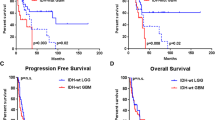Abstract
The PCAF gene encodes the p300/CBP-Associated Factor (PCAF), a histone acetyltransferase, which regulates p53 by acetylation of Lys320 in the C-terminal portion of p53. While the p53 gene is one of the most frequently mutated tumor suppressor genes in human tumors, such mutations occur in only 30% of astrocytic tumors. Since PCAF can regulate p53 activity, abrogation of PCAF function by PCAF gene mutation could be an alternate mechanism to inactivate the p53 pathway in tumors lacking p53 mutations. To test this hypothesis, we determined the nucleotide sequence of the entire PCAF coding region in 37 astrocytic tumors (17 glioblastomas, 10 anaplastic astrocytomas, 7 low-grade astrocytomas, and 3 pilocytic astrocytomas). We detected two single-nucleotide alterations that represented non-deleterious polymorphisms (GAG > GAA Glu103Glu, AAT > AGT Asn386Ser) but no obvious functional mutations. Moreover, the frequency of the Asn386Ser allele that contained Ser386 in glioma patients was not statistically different from its frequency in individuals without disease, and no significant association was observed between the PCAF polymorphisms and the presence or absence of p53 mutations in the tumors. We conclude that the PCAF gene is not mutated during the development of the astrocytic tumors studied here.
Similar content being viewed by others
References
Cavenee WK, Bigner DD, Newcomb EW, Paulus W, Kleihues P: Diffuse astrocytomas. In: Kleihues P, Cavenee WK (eds). Pathology & Genetics of Tumours of the Nervous System. IARC Press, Lyon, 1997, pp 2-9
Louis DN: A molecular genetic model of astrocytoma histopathology. Brain Pathol 7: 755-764, 1997
He J, Olson JJ, James CD: Lack of p16INK4 or retinoblastoma protein (pRb), or amplification-associated overexpression of CDK4 is observed in distinct subsets of malignant glial tumors and cell lines. Cancer Res 55: 4833-4836, 1995
Schmidt EE, Ichimura K, Reifenberger G, Collins VP: CDKN2 (p16/MTS1) gene deletion or CDK4 amplification occurs in the majority of glioblastomas. Cancer Res 54: 6321-6324, 1994
Ueki K, Ono Y, Henson JW, von Deimling A, Louis DN: CDKN2/p16 or RB alterations occur in the majority of glioblastomas and are inversely correlated. Cancer Res 56: 150-153, 1996
Costello J, Plass C, Arap W, Chapman VM, Held WA, Berger MS, Su Huang H-J, Cavenee WK: Cyclin-dependent kinase 6 (CDK6) amplification in human gliomas identified using two-dimensional separation of genomic DNA. Cancer Res 57: 1250-1254, 1997
Fults D, Brockmeyer D, Tullous MW, Pedone CA, Cawthon RM: p53 mutation and loss of heterozygosity on chromosomes 17 and 10 during human astrocytoma progression. Cancer Res 52: 674-679, 1992
von Deimling A, Eibl RH, Ohgaki H, Louis DN, von Ammon K, Petersen I, Kleihues P, Chung RY, Wiestler OD, Seizinger BR: p53 mutations are associated with 17p allelic loss in grade II and grade III astrocytoma. Cancer Res 52: 2987-2990, 1992
Louis DN, von Deimling A, Chung RY, Rubio MP, Whaley JM, Eibl R, Ohgaki H, Wiestler OD, Thor AD, Seizinger BR: Comparative study of p53 gene and protein alterations in human astrocytic tumors. J Neuropathol Exp Neurol 52: 31-38, 1993
Yang XJ, Ogryzko, VV, Nishikawa J, Howard BH, Nakatani Y: A p300/CBP-associated factor that competes with the adenoviral oncoprotein E1A. Nature 382: 319-324, 1996
Brownell J, Zhou J, Ranalli T, Kobayashi R, Edmondson D, Roth S, Allis CD: Tetrahymena histone acetyltransferase A: a transcriptional co-activator linking gene expression to histone acetylation. Cell 84: 843-851, 1996
Struhl K: Histone acetylation and transcriptional regulatory mechanisms. Genes Dev 12: 599-606, 1998
Liu L, Scolnick DM, Trievel RC, Zhang HB, Marmorstein R, Halazonetis TD, Berger SL: p53 sites acetylated in vitro by PCAF and p300 are acetylated in vivo in response to DNA damage. Mol Cell Bio 19: 1202-1209, 1999
Sakaguchi K, Herrera JE, Saito S, Miki T, Bustin M, Vassilev A, Anderson CW, Appella E: DNA damage activates p53 through a phosphorylation-acetylation cascade. Genes Dev 12: 2831-2841, 1998
Scolnick DM, Chehab NH, Stavridi ES, Lien MC, Caruso L, Moran E, Berger SL, Halazonetis TD: CREB-binding protein and p300/CBP-associated factor are transcriptional coactivators of p53 tumor suppressor protein. Cancer Res 57: 3693-3696, 1997
Candau R, Zhou JX, Allis CD, Berger SL: Histone acetyltransferase activity and interaction with ADA2 are critical for GCN5 function in vivo. ENBO J 16: 555-565, 1997




